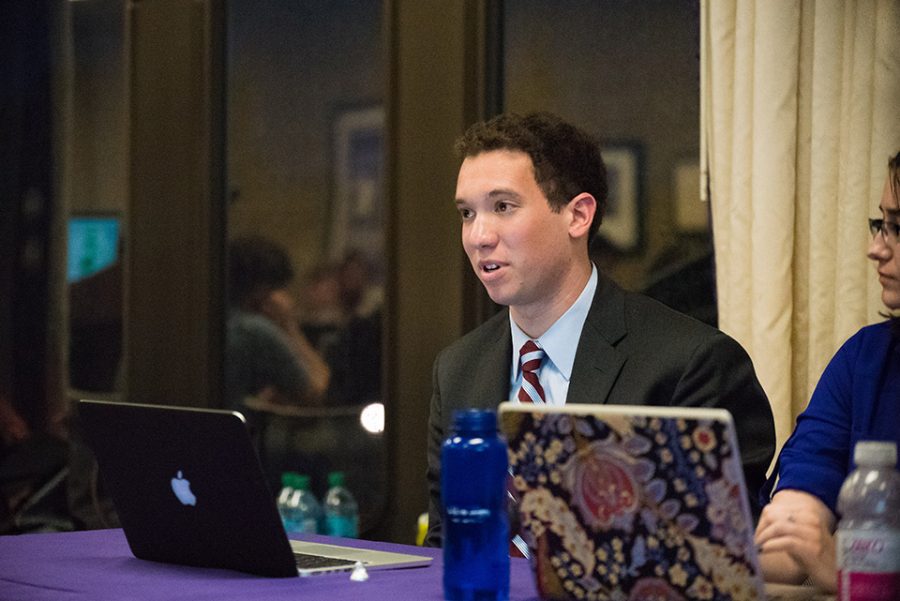ASG Senate passes A-status funding, pushes open membership resolution vote to next week
Sophie Mann/Daily Senior Staffer
Weinberg junior Eric Oringer explains the A-status funding process to senators at Associated Student Government Senate. More than $1.1 million was allocated, and student groups appealed for additional funds.
May 26, 2016
Associated Student Government Senate approved Wednesday more than $1.1 million in funding to A-status student groups, in addition to granting almost $6,000 in supplementary funds.
The A-status finances committee allocated funds to about 40 student groups, using money from the $58 quarterly student activity fee.
Chaired by Weinberg junior Eric Oringer, vice president for A-status finances, the committee reviews applications from larger student groups that hold campus-wide events that have been “successful” in the past, Oringer said.
Together, A&O Productions and Mayfest take up about half of the A-status funding.
At the meeting, student groups appealed to Senate for more funding in addition to what the A-status finances committee initially recommended. Oringer said the committee does not fund group requests or events in full because funds are limited.
Senate has an amendment pool of nearly $58,000 to pay for approved supplementary funding, but not all of the money was disbursed because funds must be available for allocation in the fall, Oringer added.
Supplemental funding works in three stages: an add round when student group representatives can request additional funds, a cut round when student group representatives can ask for less money and a final add round when student group can re-submit requests for additional funds.
Six student groups were approved for additional funding by Senate: Kaibigan, Muslim-cultural Students Association, Habitat for Humanity, Alternative Student Breaks, Northwestern Community Development Corps and For Members Only.
NCDC was granted an additional $600 and FMO was granted an additional $375 in the second add round. Initially, NCDC asked for $1,200 and FMO asked for $2,954. Senate rejected the two group’s first requests but granted the lesser funds in the second add round.
Oringer said the committee could not recommend the additional funding request of almost $3,000 to FMO because the group hosts events with other organizations and it would be unfair to groups that have hosted large-scale events independently.
“While (Ball) was successful, you put it on with A&O,” Oringer said. “It’s not the same as your exec board single-handedly putting on the event. … You guys worked well together, but we just feel like it would be irresponsible to give a huge increase to you without the institutional knowledge.”
Institutional knowledge is the executive board’s ability to manage logistics and train future executive boards to run successful events. This information is considered by the committee when allocating funds.
SESP freshman Sky Patterson, FMO’s senator, said the group needed additional funds because the group had faced internal problems with past executive boards. She said FMO has still been able to host successful events, even if it was in collaboration with other student groups.
With additional funding, Patterson said FMO could build the institutional knowledge the committee was encouraging.
“It sounds like they were saying that it would be irresponsible because it sounds like they don’t have a lot of faith we would be able to put on an event single-handedly,” Patterson said to senators. “A-status encourages co-sponsorships.”
Some groups such as Dance Marathon requested funding in both add rounds but were rejected both times.
Earlier in the meeting, ASG also heard a resolution to increase the student activity fee by 5 percent beginning in the 2017-18 school year. The resolution will be voted on next week, but even if it passes, the increase must be approved by the Board of Trustees.
Senate was also scheduled to vote on a resolution disavowing the potential open student group admission proposal. However, after funding was voted on, Senate lost quorum — the required number of senators in attendance to conduct Senate, parliamentarian Shelby Reitman, a Weinberg sophomore, told The Daily. Senate is scheduled to vote on the resolution next week at the last Senate of the quarter.
“The next bill on the docket presumably is going to be a fight and everyone’s exhausted,” Weinberg sophomore Jake Rothstein said before Senate was adjourned. “ I just don’t think it’s fair to us or to the sanctity of discussion.”
Email: [email protected]
Twitter: @ericasnoww


